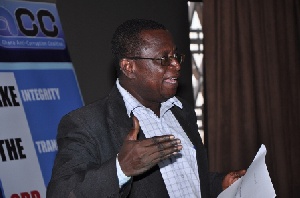Dr Kwesi Jonah, a senior political science lecturer at the University of Ghana, has appealed to political parties in the country to strengthen the capacities of their research department.
This, he said, would ensure that the parties’ investigate and come out with real issues which the electorate want them (parties) to address and effect the needed changes.
Dr Jonah said this during a visit of the Malawian and South Sudanese delegation to understudy the operations of political parties in the country.
The four-day visit, which was sponsored by the Netherlands Institute for Multiparty Democracy (NIMD), was hosted and facilitated by the Institute of Economic Affairs.
He said although it is politically wise for a party to have some ideologies and beliefs which would serve as the platform on which it would sell itself to the electorate, that might not be the focus and of necessity to the ordinary Ghanaian.
“What the ordinary people care about is not political ideologies but bread and butter, good education for their children and good jobs and other necessities of life,” he said.
He said though all parties in the country had written down manifestos, very few Ghanaians care to read them.
“They prefer to listen to media discussions about manifestos by party activists and political commentators. This means that party activists should spend more time on radio educating the electorate on their plans for the people,” he said.
He cited education, health, jobs, sanitation and agriculture as some of the most important issues to the Ghanaian voter, adding that foreign policy might probably be the most unimportant issue to Ghanaian voters.
Dr Jonah said poorly financed decentralised structures, poorly financed national development planning commission, and weak party research department were some of the challenges militating against the translation of party policy into national policy.
Mr. Jerome Scheltens, Programme Manager, NIMD, cited party continuity, legitimacy and accountability, and support base for leadership as some for benefits party tend to derive from drawing an election programme or manifesto.
He appealed to politicians to desist from promising the electorate what they know they could not deliver, as such acts tend to cast a spur on the little trust they have in them.
Dr Ransford Gyampo, Research Fellow, IEA, said the objective of the visit was to share lessons on issues relating to how to improve on political activities in Malawi and South Sudan.
Mr. Levson Gania, Secretary –General, Malawian Forum for Unity and Development (MAFUNDE), lauded NIMD for the initiative as the programme would help them improve on their campaign messages for their election campaign next year.
He said he had now gained a broad knowledge on how to package his party’s message in order to attract more people.
Politics of Wednesday, 30 October 2013
Source: GNA

















